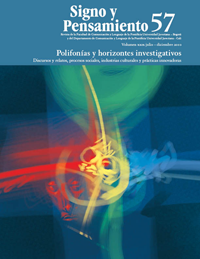Resumo
El presente texto retoma el tema de la revisión de la identidad nacional en el mundo globalizado adoptando dos perspectivas: la teórica, a través del concepto de “narrativas de nación” explorado por Anderson, Appadurai, Bhabha, Bauman y otros ( Lopes, 2006), y la epistemológico-metodológica de trabajo en “comunidades virtuales” conformadas por los movimientos migratorios contemporáneos. Se propone la confluencia de estas dos perspectivas en una experiencia metodológica de investigación empírica incipiente, cual es la recepción de la telenovela brasilera en un espacio particular e inédito: la comunidad virtual de brasileros en Portugal. Se trata, por lo tanto, de una exploración metodológica en el espacio virtual que tiene implicaciones epistemológicas para la investigación en general y para la comunicación en particular.
Anuario obitel (2007). Culturas y mercados de la ficción TV en Iberoamérica. Barcelona: Gedisa. — (2008). Mercados globais, histórias nacionais. São Paulo, Editora Globo.
— (2009). A ficção televisiva em países ibero-americanos: narrativas, formatos e publicidade. São Paulo, Editora Globo.
— (2010). Convergências e transmidiação da ficção televisiva. São Paulo, Editora Globo.
Appadurai, A. (1990). “Disjuncture and difference in the global culture Economy”. En: Featherstone, M. Global culture. London, Sage.
— (1997). Modernity at large. Cultural dimensions of globalization. Minneapolis, University of Minnesota Press - Open University Press. Bauman, Z. (1999). Modernidade e ambivalência. Rio de Janeiro, Jorge Zahar Ed.
— (2001). Modernidade líquida. Rio de Janeiro: Jorge Zahar Ed. Bhabha, H. (1990). (Edit.) Nation and narration. London, Routledge.
— (2001). O local da cultura. Belo Horizonte, Ed.ufmg.
Elkins, D. (1997). “Globalization, telecommunications and virtual ethnic communities”, en: International Political Science Review, vol.18, núm.2.
Gellner, E. (1983). Nations and nationalism. Oxford (Inglaterra) y Cambridge (Estados Unidos), Blackwell.
Hall, S. y du Gay, P. (1996). Questions of cultural identity. London, Sage. Hine, C. (2004). Etnografía virtual. Barcelona, Editorial UOC.
— (2005). “Virtual methods and the sociology of cyber-social-scientific knowledge”. En: Hine, C. (Edit.).Virtual methods. Issues in social research on the internet, Oxford, Berg.
Ianni, O. (1994). “Globalização: novo paradigma das Ciências Sociais”, em: Revista Estudos Avançados usp, núm. 45.
Lévy, P. (1996). O que é o virtual? São Paulo, Editora 34.
— (1999). Cibercultura. São Paulo, Editora 34.
Lopes, M. (2003, ene-abr). “A telenovela brasileira: uma narrativa sobre a nação”. Revista Comunicação & Educação, num. 25.
— (2004). “Para uma revisão das identidades culturais em tempos de globalização” en: Lopes, M. (Org.), Telenovela. Internacionalização e Interculturalidade. São Paulo, Loyola Lopes, M. et.al. (2002). Vivendo com a telenovela: mediações, recepção e teleficcionalidade. São Paulo, Summus.
Mougge, C. (1994). “For a politics of nomadic identity” em: Robertson, G. et al. (eds.), Travellers’ tales: narratives of home and displacement. New York, Routledge.
Newcomb, H. (1999), La televisione da forum a biblioteca, Milano, Sansoni. Papadakis, M. (2004) Computer-mediated communities: A bibliography on information, communication, and computational technologies and communities of place, sri International.
Rheingold, H. (2010) Virtual communities [online], disponivel em: http://www.well.com/ user/hlr/vcbookintro.html, recuperado: 17 de agosto de 2010.
Schneider, S y Foot, K. (2005), “Web sphere analysis: An approach to studying online action”, em: Hine, C. (Edit.), Virtual methods. Issues in social research on the internet. Oxford, Berg.
Smith, A. (1999) Nações e nacionalismo numa era global, Oeiras, Celta Editora.
Esta revista científica se encuentra registrada bajo la licencia Creative Commons Reconocimiento 4.0 Internacional. Por lo tanto, esta obra se puede reproducir, distribuir y comunicar públicamente en formato digital, siempre que se reconozca el nombre de los autores y a la Pontificia Universidad Javeriana. Se permite citar, adaptar, transformar, autoarchivar, republicar y crear a partir del material, para cualquier finalidad (incluso comercial), siempre que se reconozca adecuadamente la autoría, se proporcione un enlace a la obra original y se indique si se han realizado cambios. La Pontificia Universidad Javeriana no retiene los derechos sobre las obras publicadas y los contenidos son responsabilidad exclusiva de los autores, quienes conservan sus derechos morales, intelectuales, de privacidad y publicidad.
El aval sobre la intervención de la obra (revisión, corrección de estilo, traducción, diagramación) y su posterior divulgación se otorga mediante una licencia de uso y no a través de una cesión de derechos, lo que representa que la revista y la Pontificia Universidad Javeriana se eximen de cualquier responsabilidad que se pueda derivar de una mala práctica ética por parte de los autores. En consecuencia de la protección brindada por la licencia de uso, la revista no se encuentra en la obligación de publicar retractaciones o modificar la información ya publicada, a no ser que la errata surja del proceso de gestión editorial. La publicación de contenidos en esta revista no representa regalías para los contribuyentes.


